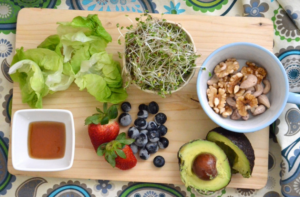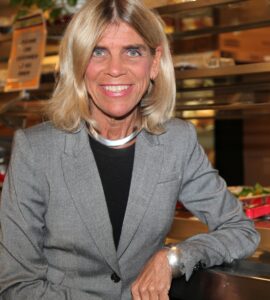By David Wilkening, Contributing Writer

REGION – What are your eating habits? You are probably like most of us: a “meat and potatoes” person. You may like vegetables but are not likely to be a strict vegetarian. Or even a semi-vegetarian who eats more than eggs and dairy foods but also occasionally meat, poultry, fish and seafood.
But whatever your preference, your taste in food probably has a growing interest in healthy eating, especially as you get older. And that interest extends to “superfoods”― as illustrated by the market growing in 2020 to a value of $733 billion. It’s expected to be $1 trillion in just a few years.
Not just fruits and vegetables

It doesn’t mean that you are a vegetarian or vegan and never eat meat or dairy―you are just proportionately choosing more of your foods from plant sources,” says Katherine D. McManus, a well-known Boston nutritionist.
Photo/Submitted
Superfoods are broadly defined as foods in a diet that help promote good health and also have a positive impact on various diseases that are often associated with older age. And a key area of that diet is based primarily on plant-based food. But that might not be exactly what you think.
“That includes not only fruits and vegetables, but also nuts, seeds, oils, whole grains and beans. It doesn’t mean that you are a vegetarian or vegan and never eat meat or dairy. Rather, you are proportionately choosing more of your foods from plant sources,” said Katherine D. McManus, a well-known nutritionist whose titles include Director of Nutrition Services at the Boston-based Dana-Farber/Harvard Cancer Center.
There is evidence that the plant-based diet is not only healthy but disease-preventing. “Much nutrition research has examined plant-based eating patterns such as the Mediterranean diet and a vegetarian diet. The Mediterranean diet has a foundation of plant-based foods; it also includes fish, poultry, eggs, cheese and yogurt a few times a week, with meats and sweets less often,” said McManus.
Healthier diets
These diets in population studies and clinical trials have reduced the risk of heart disease, diabetes, certain cancers (particularly colon, breast and prostate center), even depression. And in older adults, the studies showed a decreased rate of fragility, as well as better mental and physical functions.
Superfood is defined in the Merriam-Webster dictionary as “food (such as salmon, broccoli or blueberries) that is rich in compounds (such as antioxidants, fiber or fatty acids) considered beneficial to a person’s health.”
Early attention to superfoods did not originate though nutrition scientists or dietitians. It all started with a banana near the time of the First World War in the early 20th century. The United Fruit Company began touting the nutritional value of bananas. Their suggestion was to include them in morning cereals and midday lunch salad snacks. Medical studies followed as a multi-billion-dollar industry evolved with plant-based products becoming known for their positive health qualities and disease-resistance qualities.
Critics of superfoods often concede many have positive values but caution that not all such claims have been positively proven. Some studies are still based on early outlooks, for example. Critics urge consumers not to blindly embrace every new superfood or fad, but instead to cultivate a variety of proven nutritious options.
Food is hardly the first thing you consider, either, when reducing chances of dementia or Alzheimer’s but there is evidence it has an enormous impact on that, suggests Alvaro Pascual-Leone, professor of neurology at Harvard Medical School. He advocates the Mediterranean-based MIND (Mediterranean-DASH Intervention for Neurodegenerative Delay) diet in conjunction with exercise and other lifestyle chances that he says reduces chances of getting dementia by at least 40 percent.
DASH is the Dietary Approaches to Stop Hypertension diet. It is a diet of green leafy and other vegetables, nuts, berries, beans, and whole grains. Fish is ruled to be acceptable about “once-a-week.” And poultry is part of it “at least for two meals a week.” And those who prefer an alcoholic drink are not left out, either. The MIND diet suggests one glass of wine daily.
The MIND diet also warns against unhealthy foods. These include red meats, with a suggestion of limiting them to three meals a week, butter and margarine, limiting to one teaspoon a day, cheese, limiting to one serving a week and, pastries and sweets, limiting to four servings a week.
Mental health benefits
Diet can also not only contribute to physical but mental health, and aid in alleviating depression and anxiety, according to Dr. Una Naidoo, who is both a Harvard-trained psychiatrist and professional chef with culinary school training. The author of the book “This Is Your Brain On Food,” she also founded and directs the first hospital-based nutritional psychiatry service in the United States as the Director of Nutritional and Lifestyle Psychiatry at Massachusetts General Hospital.
“Incorporating more plants into your diet can start with simply tacking on two to three sides of vegetables to every meal, like broccoli, cauliflower or spinach. They can be either fresh or frozen,” she said.
“Instead of superfood, I’d rather call it the seafood diet or some sort of protein diet. Seniors need more protein, with food such as eggs, fish, yogurt, milk and yogurt,” said Nancy Clark, a Boston-based nutritionist for 40 years, a book author, and food consultant to professional sports teams such as the Boston Celtics.
Changing perspective and habits

The real issue is not just protein, however. Clark said the real trick to healthy food is to balance vitamins, minerals, carbohydrates and proteins. No single food is nutritionally complete.
McManus also has various suggestions for maintaining a healthy diet.
One of her tips is to eat vegetables as a snack, and to eat a lot of them for lunch and dinner. “Fill half your plate,” she said.
She also suggests changing how you view meat. User smaller amounts. Use them as garnishes instead of centerpieces.
Tofu might not appeal to everyone but there’s always dessert. Eat fruit, she says. A ripe and juicy peach, a slice of watermelon or a crisp apple. All “will satisfy your craving for a sweet bite after a meal.”
RELATED CONTENT:
Proper hydration is important for your health (fiftyplusadvocate.com)
Slowing down the aging process may not be as hard as you think (fiftyplusadvocate.com)
Noise pollution is more than an inconvenience (fiftyplusadvocate.com)












